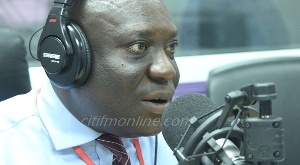The government of Ghana is determined to retool and reposition the Ghana Meteorological Agency (GMet), to become the best meteorological institution in the sub-region.
"The government has demonstrated this commitment by procuring a number of equipment such as automatic weather stations, calibration equipment, vehicles and a number of others”.
Mr Vincent Sowah Odotei, Deputy Minister of Communications, said this in Accra on Wednesday, at the opening of a National Consultative Workshop for the establishment of a National Framework for Climate Services in Ghana.
He said Ghana, is a Co-Chair of the United Nations' Sustainable Development Goals (SDG) Advocacy Group, was particularly keen on empowering the GMet, to take the needed climate action, in pursuance of the attainment of SDG 13.
"It is important for Ghana to tailor our climate services to the needs of end-users, and climate information should respond to the specific needs of users through the relevant forecast, based on advisory services and decision-making tools," said the Deputy Minister.
Mr. Odotei noted that the implementation of Ghana's National Framework for Climate Services required strong partnerships and collaboration with international organisations and user groups such as sectorial experts, government agencies, the private sector and the academia.
He said the government would support GMet, which was the lead agency in the implementation, to ensure that climate services were efficiently provided for the improvement of climate information products, predictions and outlook.
The Deputy Minister said the government through the Ministry of Communication would ensure that the framework was implemented to the letter.
He said flagship programmes being implemented by the government, such as the Planting for Food and Jobs, One village one Dam and One District One Factory were all climate reliant, which made the establishment of the national framework timely.
"The Ministry through GMet, would promote and strengthen public education campaigns to all end-users, on how climate plays a key role in their activities and informs their activities," Mr. Sowah said.
Dr. Michael Tanu, the Director-General of the Ghana Meteorological Agency, who chaired the programme, said climate change and the increase in the frequency of extreme weather events such as drought, flash floods, landslides and rising temperatures in the midst of massive urbanization, "threatens our very survival."
He said National Meteorological and Hydrological Services, therefore, needed to develop early warning systems, to help mitigate the impact of these disasters as a matter of urgency.
Dr. Tanu added, "though some work on this has been done in various agencies and institutions in the country, there is the need for collaboration and coordination for resilience."
The three-day workshop is being hosted by GMet, under the auspices of the Ministry of Communication.
General News of Friday, 12 July 2019
Source: ghananewsagency.org

















